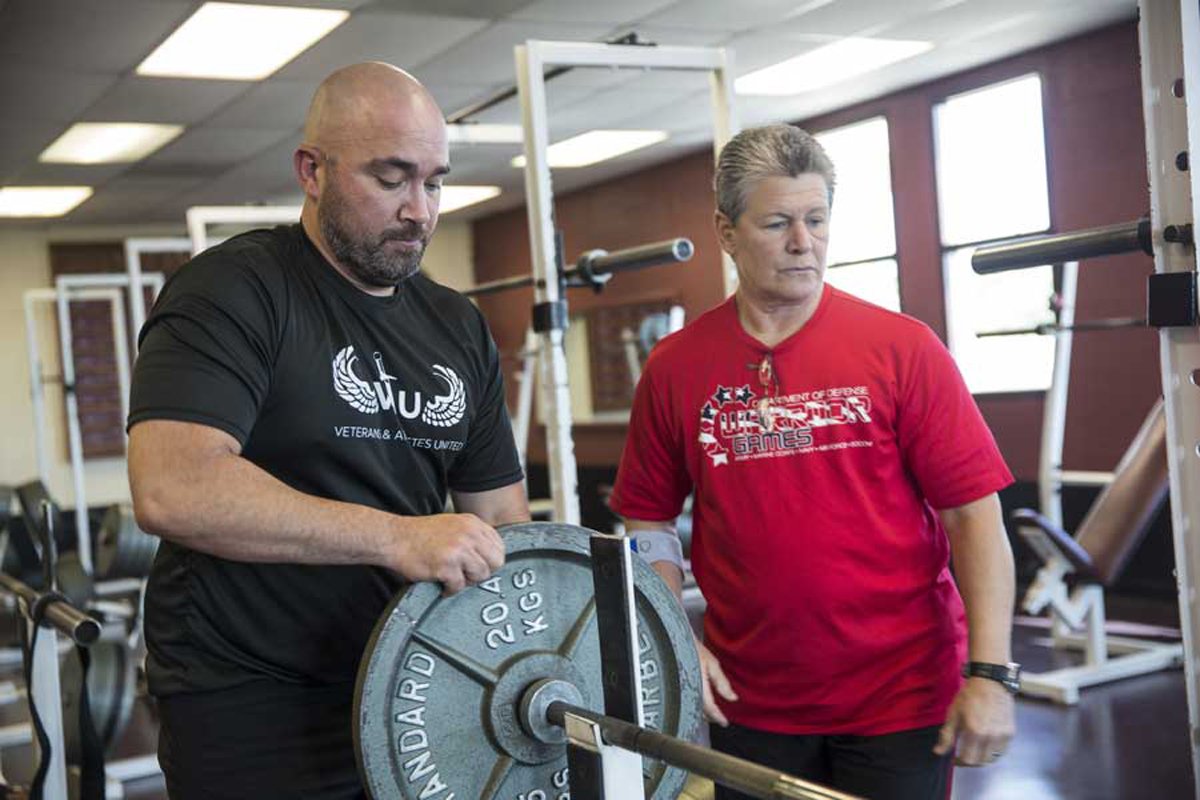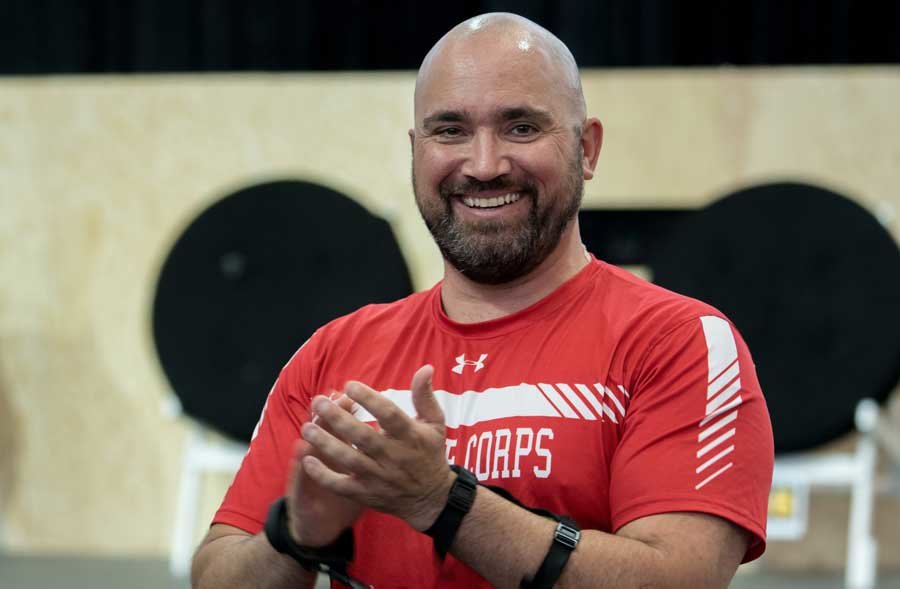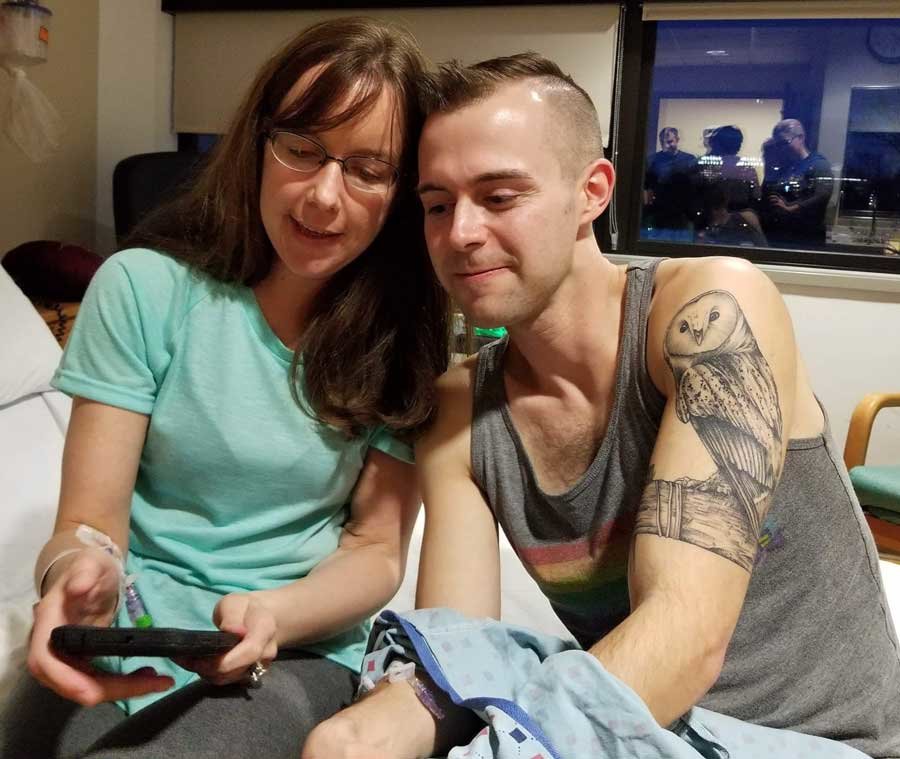Should the Defense Health Agency Take Over Military Healthcare Management?

U.S. Marine Corps veteran Charles Dane adds weight to the bar during a 2018 Defense Department Warrior Games powerlifting practice at Cheyenne Mountain High School in Colorado Springs, Colorado. Dane was medically retired from the military after a 19-year career. Photo by Cpl. Juan Madrigal, courtesy of the U.S. Marine Corps.
This article was originally published on July 9, 2020, at The War Horse.
In early January, Charles Dane checked into Walter Reed National Military Medical Center.
He felt exhausted. He looked swollen. His kidney function rate was 13%, which meant symptoms of kidney failure had set in. And without dialysis or a new kidney, he wouldn’t live.
As he talked to his doctors, he learned an organ transplant would likely go better if he avoided dialysis.
But after finding a donor, going through all of the checks required for the surgery, arranging travel, and getting approval from his donor’s command, Dane, 43, checked out of Walter Reed without a kidney.
As the Defense Health Agency begins to take over management of the Army, Navy, and Air Force medical commands, and at the same time the Army works to flip management of its doctors to front-line units rather than Army Medical Command, Dane’s doctor received orders to deploy.

“My nurse said that had never happened before,” Dane said. But the day of his surgery, he was told 10 families were affected by the doctor’s deployment.
Last October, the Defense Health Agency, a combat support organization that provides medical support staff across all branches, began to take over management of all the military hospitals and clinics. The change would mean the Army, Navy, and Air Force no longer managed their own health care systems. At the same time, the Army shifted some of its medical systems so they fell outside Army Medical Command.
In the past, doctors were assigned to military hospitals and clinics but had outside assignments to nonmedical units for training and deployments. This system, known as the professional filler system, or PROFIS, still allowed the hospitals some leeway when it came to deployments: If a doctor had a full schedule or was so specialized that no one else could fill in for him or her, the hospital had 20 working days to find a replacement to fill the deploying unit’s position.
But now, if a doctor receives deployment orders, a reservist fills his slot at the medical facility. The new system, “reverse-PROFIS” or modified table of organization and equipment assigned personnel (MAP), is meant to ensure military doctors are trained and ready to deploy, with their time at the medical facilities primarily serving to keep their medical skills honed for deploying. So, they pull duty at the medical facilities, but they are assigned to deployable units.
Doctors in the new program are expected to cross-train with their assigned units 15 days a year, as well as to deploy if their assigned units go overseas, according to an Army public affairs story.
But Walter Reed is the only military hospital that performs kidney transplants, and Dane’s doctor had a full caseload. Over the surgeon’s two-month deployment, six living-donor kidney surgeries for veterans were delayed, said Mary Constantino, a spokesperson for the hospital, in an email. When the doctor returned from deployment, two patients received kidneys from living donors and 10 received cadaver kidneys, she said. “Elective surgeries” were then delayed because of Covid, so she said four of the living-donor surgeries were postponed until after the hospital lifts restrictions.
Dane medically retired from the Marine Corps in 2018, after 19 years in service, including two deployments to Iraq and two to Afghanistan, because of his polycystic kidney disease. But if he could find someone willing to donate a kidney—a living, healthy donor—it would almost immediately add years to his life.
While Dane was at the Wounded Warrior Battalion—West program at Camp Pendleton, he said he got to know Jennifer Tullis, who used to work at the Marine Corps’ Warrior Care program. When she found out he needed a kidney, Tullis created a Facebook page looking for a donor, Dane said. His donor, who asked not to be named because she remains on active duty, reached out to the regional transplant coordinator. She and Dane began talking on Facebook.
“We met for the first time the other day when I picked her up from the airport,” Dane said in January. “Her personality was familiar: She’s a Marine.”
Both of them were excited, he said. She, because she had the chance to save a life. He, because he had an opportunity for a new beginning. He had been dealing with polycystic kidney disease since being diagnosed in 2008.
Both aides agreed that the switch to Defense Health Agency oversight is important, but also said that the military is about “three years behind” where they should be in the process.
“It affected my quality of life as things went on,” he said. “I was hoping that, after this, I could start something new.”
After months of planning, his donor traveled—with permission and time off from the Marine Corps—to Bethesda from Michigan, and Dane drove up from Louisiana with his dog. Both donor and recipient checked into the hospital. They laughed and talked and hoped. But just before the operation, Dane was told his surgeon had orders to deploy with a unit out of Fort Bragg.
The hospital discharged Dane and his donor, without offering further information. Would the orders be rescinded? Would someone else take the surgeon’s place?
Dane knew little about the new reorganization. The DHA takeover was meant to improve healthcare efficiency and reduce costs with the following changes: transfer expensive military care to civilian doctors near military bases; improve military medical readiness by making sure the different branches worked and trained together; and make sure that medical personnel were deployable.
But the process of passing overarching control from the services to the Defense Health Agency hasn’t gone smoothly—and no one expected it to, because the three different services want, as usual, to do things three different ways, said a Congressional House aide who spoke on the condition of anonymity.
The House aide said the services are still in the process of figuring out who’s working where and who’s supposed to be in a deployable unit, adding that Dane’s case isn’t the first time a problem has arisen.
A second House aide, who also requested that his name be withheld, said that a year ago, an Army unit recalled a doctor without checking to see what his caseload looked like.
“Nobody knows who’s supposed to be assigned where,” the aide said, adding that the schedule needs to be worked out ahead of time. But he said the switch to the Defense Health Agency is supposed to ensure that everyone’s on the same page and doctors with caseloads don’t suddenly receive deployment orders.
Both aides agreed that the switch to Defense Health Agency oversight is important, but also said that the military is about “three years behind” where they should be in the process.

The aides also acknowledged the difficulties the military health system faces right now. A series of studies and reviews have been ordered, including a Defense-wide review pushed by the Secretary of Defense, a Military Modernization Study requested by Congress on military treatment facilities, and internal studies to determine the best course of action for the Defense Health Agency moving forward.
“I think, in this case, you had the perfect storm of events,” one of the aides said about the surgeon who had to deploy, putting Dane’s organ transplant on hold. It was inevitable.
In October, DHA assumed control of the military medical commands, resulting in several changes to the Army’s medical departments and commands, including flipping its doctors from being assigned to military treatment facilities to being assigned to deployable units.
Secretary of the Army Ryan McCarthy also questioned, in a December memo to the Deputy Secretary of Defense, DHA’s readiness to manage all of the Defense Health System, including consolidating 57 hospitals and more than 400 clinics, and including overseas facilities by the end of fiscal year 2021—and running combatant command health care. McCarthy recommended halting the transition of military treatment facilities to the Defense Health Agency until it provided a clear plan. And he asked Congress to repeal the portion of the 2019 National Defense Authorization Act that handed Army Public Health Command, as well as Medical Research and Materiel Command, to the DHA.
The Army did not respond to questions about the memo, but provided a comment by email:
“The Army is committed to ensuring medical readiness and providing the highest quality care to our Soldiers and their families,” said Army spokeswoman Heather Hogan, who added, “The Army does not comment on internal communications between or among service secretaries.”
Assistant Secretary of Defense for Health Affairs Thomas McCaffery said, during a media roundtable in February, that manpower issues would be addressed in a June report to Congress, possibly presenting a plan that addresses McCarthy’s concerns about the restructuring. But as priorities shifted, McCaffery told a group of defense reporters that he now spends between 80 and 90% of his time responding to the coronavirus.
“I need a kidney,” Dane said in January, as he waited for news of whether his surgery would happen. “I’m not going to die tomorrow. I’m not at 5%, but I’m not at 20%, either.”
For days, still in Bethesda, staying at the Navy Lodge, Dane received no word of when—or whether—the organ transplant would take place.
“I need a kidney,” Dane said in January, as he waited for news of whether his surgery would happen. “I’m not going to die tomorrow. I’m not at 5%, but I’m not at 20%, either.” Eventually, his donor flew back to Michigan. “I don’t harbor a lot of ill will toward Bethesda,” Dane said. “It’s shitty what happened, but he’s an active-duty soldier who’s on orders.”
The first week of January, MAP doctors deployed with units out of Fort Bragg as part of the new system, and they had between 24 and 48 hours’ notice, according to an Army consultant report from the Uniformed Services Academy of Family Physicians.
When asked how the new changes affect medical staffing at Walter Reed, and how the process works when Walter Reed doctors on the roster are deployed, a spokesperson at the hospital referred the question to the Army.
The Army referred the questions back to Walter Reed and did not respond to questions about the reverse-PROFIS program.
In terms of a delayed surgery like Dane’s, lawmakers in the House Armed Services Committee will continue to provide oversight and “when necessary, will use legislation to address critical gaps” in military care, said Monica Matoush, House Committee on Armed Services Communication Director, by email. She added that Dane’s experience was “not indicative of a widespread problem across the military health care system.”
Dane’s experience also comes just as the services have asked for a decrease of more than 17,000 military medical positions in the Defense Department’s fiscal year 2020 budget. Those spots would instead go to combat or combat-support troops.
But a recent GAO report states that the military did not adequately assess whether there would be enough providers close to bases to provide care—or whether it would actually save the military money to outsource care. It also found there’s no process in place to monitor progress or challenges.

“DOD’s plan identified actions needed to facilitate MTF restructuring, but the department is not well positioned to execute the transitions,” the report states.
The second aide said Congress has not been told what the reasoning is behind the cut—including how that might change with the pandemic.
For now, the DHA transition has been put on hold, which means DHA will not take over management of five treatment facilities until after a 90-day pause.
Then the DHA plans to reassess whether to begin again, or recommend another pause to continue focusing their resources on the pandemic response.
Despite the pause—and the issues cited in the GAO report—McCaffery told reporters in June that they plan to begin to transfer some stateside medical facilities by the end of 2020, according to Military.com. He also said he expects the plan due to Congress to be completed in the next several weeks, with the aftermath of the virus taken into consideration as the military plans for future pandemics.
But the changes raise another question: Does it make sense for the military to employ an active duty, highly specialized medical professional who performs expensive surgeries almost entirely on civilian dependents and retirees?
The Institute for Defense Analyses, a nonprofit that provides expertise in national security issues, found that medical specialists used almost exclusively for dependent and veteran health care, particularly if they are not ready to deploy, “can have large impacts on DoD cost.”
At Walter Reed, between 50 and 60 people receive kidney donor transplants a year, Constantino said. And the hospital recently put out a call for more living donors, citing an approximate 380 veterans on the national kidney transplant list. For those patients, the benefits of Walter Reed’s surgeries are clear.
Constantino said Dane and five others scheduled for surgery were offered outside care during their surgeon’s two-month deployment through the United Network for Organ Sharing, a nonprofit that manages the national organ transplantation system. Dane said he was offered that option, but the process was long and involved, so he decided to wait.
When his surgeon returned from deployment, and his donor flew back to Bethesda from Michigan, Dane received his kidney—on April 1. His donor was “practically walking on her own the next day,” he said.
By the end of April, Dane was on his way home to Louisiana and ready to get started on life.

Katie McCarthy is the managing editor for Coffee or Die Magazine. Her career in journalism began at the Columbus (Georgia) Ledger-Enquirer in 2008, where she learned to navigate the newsroom as a features reporter, copy editor, page designer, and online producer; prior to joining Coffee or Die, she worked for Outdoor Sportsman Group as an editor for Guns & Ammo magazine and their Special Interest Publications division. Katie currently lives in Indiana with her husband and two daughters.
BRCC and Bad Moon Print Press team up for an exclusive, limited-edition T-shirt design!
BRCC partners with Team Room Design for an exclusive T-shirt release!
Thirty Seconds Out has partnered with BRCC for an exclusive shirt design invoking the God of Winter.
Lucas O'Hara of Grizzly Forge has teamed up with BRCC for a badass, exclusive Shirt Club T-shirt design featuring his most popular knife and tiomahawk.
Coffee or Die sits down with one of the graphic designers behind Black Rifle Coffee's signature look and vibe.
Biden will award the Medal of Honor to a Vietnam War Army helicopter pilot who risked his life to save a reconnaissance team from almost certain death.
Ever wonder how much Jack Mandaville would f*ck sh*t up if he went back in time? The American Revolution didn't even see him coming.
A nearly 200-year-old West Point time capsule that at first appeared to yield little more than dust contains hidden treasure, the US Military Academy said.












